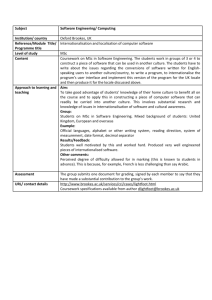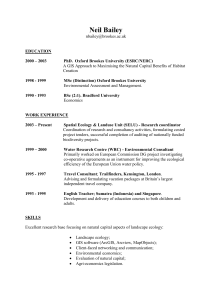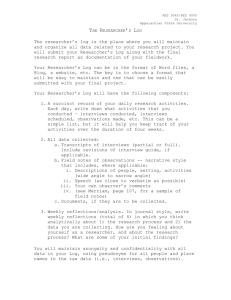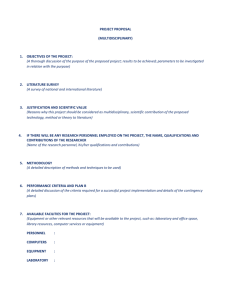Oxford Brookes Templates
advertisement
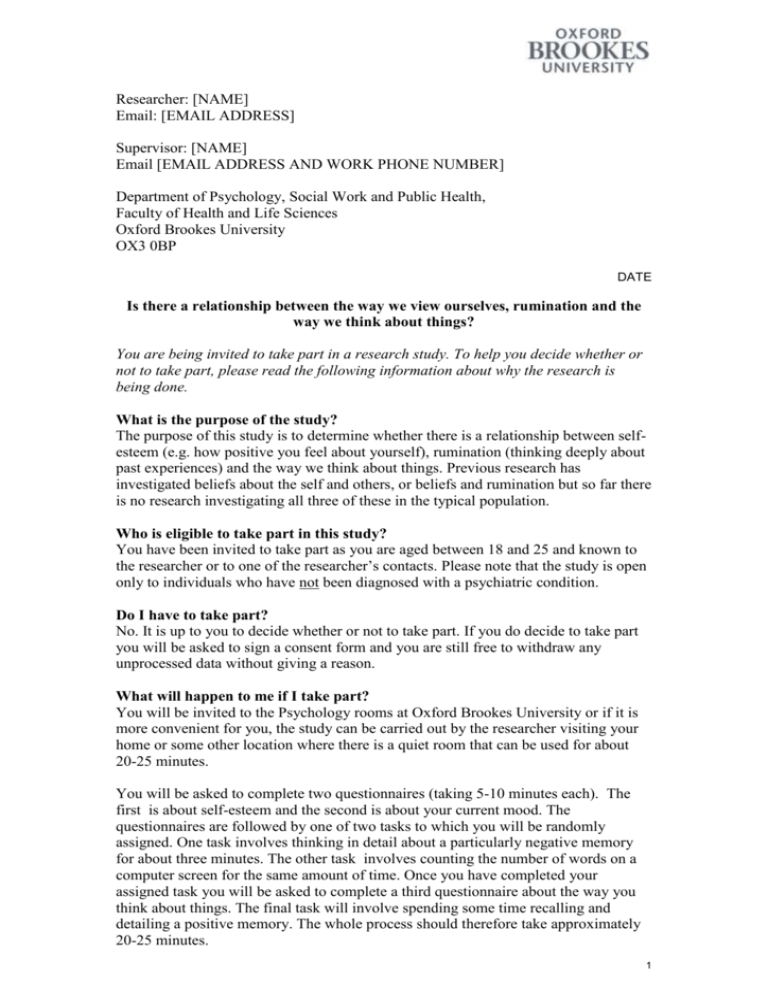
Researcher: [NAME] Email: [EMAIL ADDRESS] Supervisor: [NAME] Email [EMAIL ADDRESS AND WORK PHONE NUMBER] Department of Psychology, Social Work and Public Health, Faculty of Health and Life Sciences Oxford Brookes University OX3 0BP DATE Is there a relationship between the way we view ourselves, rumination and the way we think about things? You are being invited to take part in a research study. To help you decide whether or not to take part, please read the following information about why the research is being done. What is the purpose of the study? The purpose of this study is to determine whether there is a relationship between selfesteem (e.g. how positive you feel about yourself), rumination (thinking deeply about past experiences) and the way we think about things. Previous research has investigated beliefs about the self and others, or beliefs and rumination but so far there is no research investigating all three of these in the typical population. Who is eligible to take part in this study? You have been invited to take part as you are aged between 18 and 25 and known to the researcher or to one of the researcher’s contacts. Please note that the study is open only to individuals who have not been diagnosed with a psychiatric condition. Do I have to take part? No. It is up to you to decide whether or not to take part. If you do decide to take part you will be asked to sign a consent form and you are still free to withdraw any unprocessed data without giving a reason. What will happen to me if I take part? You will be invited to the Psychology rooms at Oxford Brookes University or if it is more convenient for you, the study can be carried out by the researcher visiting your home or some other location where there is a quiet room that can be used for about 20-25 minutes. You will be asked to complete two questionnaires (taking 5-10 minutes each). The first is about self-esteem and the second is about your current mood. The questionnaires are followed by one of two tasks to which you will be randomly assigned. One task involves thinking in detail about a particularly negative memory for about three minutes. The other task involves counting the number of words on a computer screen for the same amount of time. Once you have completed your assigned task you will be asked to complete a third questionnaire about the way you think about things. The final task will involve spending some time recalling and detailing a positive memory. The whole process should therefore take approximately 20-25 minutes. 1 What are the possible benefits and risks of taking part? There are no specific benefits to you in taking part. However, the research will contribute to our understanding of psychological processes (this is the first time these factors have been studied in this combination). Half of the participants will be asked to think about a negative memory and this can be uncomfortable. If you are unsure about this you should not volunteer to take part. However, research has shown that the effects of thinking about negative events are temporary and countered by thinking about positive memories. When you have finished all the tasks and questionnaires you will be given a debriefing sheet to keep. This gives further information about the aims and the potential implications of this study. Will what I say in this study be kept confidential? You will not be asked to give your name or any identification on any of the materials used during this experiment, so all the information you give will be anonymous. . Only the researcher and supervisor will have access to the data, which will be stored in accordance with the University's policy on Academic Integrity. The data will be used for an MSc dissertation and may form part of a published article or conference/seminar paper. The data generated in the course of the research will be kept securely in either paper or electronic form and will be destroyed one year following award of the MSc degree, or (if the data is likely to be used for a publication or conference paper) it may be kept for a period of ten years after the completion of the research project. All email contact details and messages to or from you will be deleted as soon as you have taken part in the research. What should I do if I want to take part? If you wish to take part, please email the researcher using the contact details above. Appointments can be made for any time that suits you. If you are unable to attend an appointment it would be helpful if you could give the researcher 24 hours’ notice. Who is organising and funding the research? The research is being conducted in part fulfilment of an MSc in Psychology at Oxford Brookes University. Who has reviewed the study? This study has been approved by the Department of Psychology Research Ethics Committee at Oxford Brookes University [Insert NAME and approval number]. If you have any concerns about the way in which the study has been conducted, you can contact the Psychology Research Ethics Officer, Morag MacLean, on mmaclean@brookes.ac.uk. Contact for Further Information For further information regarding this study please contact the experimenter or supervisor, their contact details can be found above. Thank you for taking time to read this information. Researcher’s name 2


